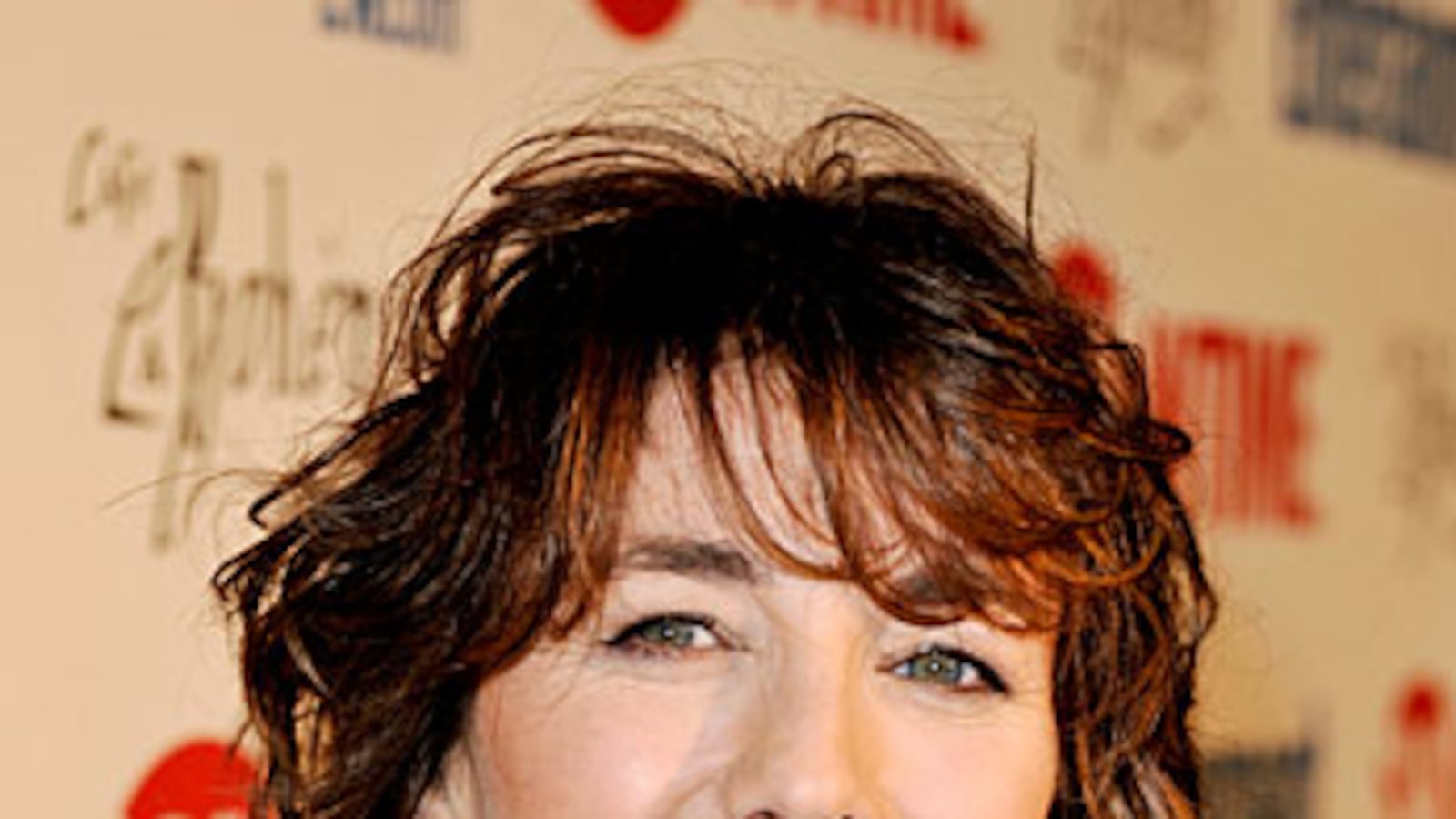
For six seasons, Showtime viewers have been hurling insults at Jenny Schecter (Mia Kirshner), the conniving character everyone loved to hate until her recent death on The L Word. This Sunday’s whodunit finale will at last lay to rest the mystery of Jenny’s murder, and will also mark the end to Showtime’s longest-running show, which brought the multidimensional lesbian community into mainstream consciousness. It also laid the groundwork for the network’s current heroine-heavy lineup, much in the same way Queer as Folk opened doors for its gay male counterparts.
At the center of it all is Ilene Chaiken—the show’s creator, writer, and executive producer, who has tackled issues ranging from “Don’t ask, don’t tell” to transgender surgery and breast cancer, not to mention regularly answering the question: What do lesbians do in bed? Chaiken has been criticized by fans for curious plot choices, but when it comes to empowering lesbians in American life, she has no equal on television.
“It felt so progressive not long ago, and then the Prop 8 battle was a setback, and then we look at the entertainment landscape and we still are desperately under-represented.”
The Daily Beast talked with the openly gay entertainment veteran about the end of lesbians on TV, killing off characters, and her plans for an even sexier sequel—girls in prison.
Let’s talk a little about the timing of The L Word’s last season. I don’t know if the word is ironic, but it seems, let’s say, unfortunate in terms of the political climate as well as Showtime’s lady-laden lineup.
When we decided that this would be the final season we certainly weren’t thinking about Proposition 8. And we certainly weren’t thinking about the election and that we’d have a more progressive political environment. It was a mutual decision [between me and Showtime], although we never discussed it explicitly, I think there was always a presumption that should I be lucky enough to have the show go on for five years, some time around there we’d be looking to say: Have we done it?
Did you consider taking the show to a gay-specific network, like LOGO?
I wanted to do it for Showtime because I had a relationship and a great working experience with them and I knew I was dealing with talented and receptive executives. Having said that, I would have done it on HBO, and I would have done it on broadcast television. What was most important to me was to do it on a mainstream network or cable network, and to make a show that cleaved to the conventions of mainstream television, not gay-specific television.
What are your thoughts about lesbians’ disappearing act on TV?
I’m very sad about that. I made a speech at the GLAAD Media Awards last year about this. I had really thought that by the time The L Word went off the air that it would no longer be the oasis in the desert, that we would be more represented, not as represented proportionately as we ultimately hope to be, but that we would have passed the baton, that there would be several more shows, that we wouldn’t be disappearing and leaving the same deficit that existed when we began. I’m dismayed. I don’t think feel it’s incumbent on The L Word to carry the entire burden of a representation, but I’m sad that there’s not something else and that we seem to be, if anything, less represented than we were six years ago.
Interestingly, there was recently a story in the New York Times about a lesbian cable-TV news host—Jane Velez-Mitchell—whose show's ratings are soaring on HLN, CNN’s sister network. So, we’ve got her and Rachel Maddow. One more and it’s a trend.
There’s something very curious about the fact that in a culture that is still largely homophobic that lesbians in these informational roles on television become huge stars. I think we’re in the midst of a cultural change and it’s just happening a little more slowly than we would have liked. It felt so progressive not long ago, and then the Prop 8 battle was a setback, and then we look at the entertainment landscape and we still are desperately under-represented. I think though that the entertainment culture does really lag behind the culture at large. I think that the way we’re represented in movies and television hasn’t caught up with the way we stand in society right now, which is far, far better than it was a few years ago.
I know there’s been some criticism with the cast, how one member is more beautiful than the other. Were certain casting choices made because an executive said, you know, TV is a visual medium? I’m also thinking of the unexpected exit of Brooke Smith’s lesbian character on Grey’s Anatomy. One theory suggested her lack of sex appeal.
No one had to say it. I set out to make a successful television show, and as I said, I wanted to make a television show with the same resources as everybody else who’s endeavoring to make commercially successful pop television. The doctors on Grey’s Anatomy are a lot better-looking than the doctors I know in most hospitals. Friends, most straight folks aren’t as pert and pretty. The same would have to apply to the lesbians of The L Word. And why not? In the first two seasons, this was something I dealt with a lot among lesbians and lesbian media, but not straight media or the mainstream media, but it’s definitely gone away. I feel much more now that all the fans, and particularly the lesbian fans of the show, savor the prettiness of the cast.
What can you disclose about The L Word’s spinoff, The Farm? We know Alice [Leisha Hailey] is in jail, and that it also stars Laurie Metcalf, Melissa Leo, and Famke Janssen.
We wanted to develop something new together, and I had always wanted to do a show about a women’s prison. I don’t want to call it a women-in-prison show because that immediately evokes the campy B movie genre. There are plenty of those, and they’re really fun, but I wanted to do a show about a women’s prison that was much more realist, about real characters that will be full of drama and relationships and melodrama because that’s what women do and are. When I talked to Showtime about it, Bob Greenblatt [Showtime’s president of entertainment] loved the idea, and was also very interested in the arena. I’m inclined to attribute it to Bob, but I think it was very collaborative, as we thought this could be a great L Word spinoff, especially considering the stories we had already committed to tell in the final season of The L Word. Furthermore, it would be a great way to bring our audience over and tell them that we’re not abandoning them, which was really important to us.
So, can I assume that Alice killed Jenny, though it’s also possible I reached through the TV to strangle her?
You can’t assume that. First, because Alice would claim she’s innocent regardless, wrongly convicted, perhaps, but also because I’d like to keep the two things separate in my mind and in the audience’s mind. I want to finish The L Word, and should the new series get picked up, and I’m very hopeful that it will, then I’m absolutely prepared to have that conversation and revisit the whole story and say well, clearly, Alice got convicted of this. But, at the end of The L Word, I want people to be thinking about whether they’re satisfied by the conclusion, and what we’re taking away with us, how we celebrated and mourned.
OK, then can I assume Alice will be greeting some hauntingly familiar faces on visiting day if The Farm is picked up?
I would certainly hope so. I think that if Alice were to go to prison, there’s no question that her friends would come to visit her, and there’s no question that my friends, the actors on The L Word, have said, “we would love to.”
So, where is the lesbian In And Out, or Brokeback Mountain?
Really good point. I would love to do an L Word movie sometime soon, and I think there are other loads of other stories to be told. I’m certainly, in and among the many things I do, going to be trying to tell more of our stories. I hope there are other people doing so, too. It’s much, much harder even in film than in television. Gay representation in commercial movies is pathetic.
We are desperate to see ourselves on the big screen. Desperate.
We’re desperate for representation, but also we’re the only ones who are going to see these movies. I don’t think that anybody will be precluded from coming to see a really good movie that happens to feature a lesbian hero or a gay hero, whether that’s an animated feature or a comedy or a drama.
The boys do always seem to have a leg up on us, so to speak.
Yes, they always get there first. That’s yet another ongoing fight in the culture. We’re not going to get there ahead of them, but sometimes when we get there, we do it better.
Last question. How would you describe success?
I would prefer not to describe success. Hunger is what I’m interested in. Still being hungry to do it, do it better, make another one, reach more people, feel momentarily gratified and at the same time horrified because you know that you could have done something better still.
Gail Eisenberg is the co-writer and co-star of Cat Eisenberg, Dog Eisenberg, an original multiplatform series commissioned by LOGO. Her work has appeared in Time Out New York, The Daily News, and Newsday, as well as on Comedy Central, HBO, and LOGO's first-ever NewNowNext Awards. She is the humor editor of Ducts.org.





